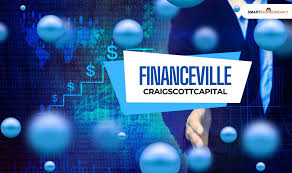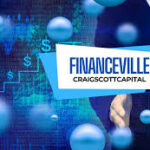The term Financeville CraigScottCapital often appears when people search for information about an investment company called Craig Scott Capital, a once-registered brokerage firm in the United States. Some online resources, like blogs or directories, use the name “Financeville CraigScottCapital” to describe or analyze its past operations.
In simple words, Financeville CraigScottCapital brings together two ideas:
Financeville, which sounds like a financial hub or online space for learning about finance, and Craig Scott Capital, a real-life brokerage that once offered trading and investment services. Over time, this phrase has become linked with stories about financial regulations, investor education, and lessons learned from past brokerage misconduct.
Many readers come across this name while researching investment safety, broker regulations, or case studies about companies that were disciplined by regulators like the Financial Industry Regulatory Authority (FINRA) or the U.S. Securities and Exchange Commission (SEC).
Understanding what happened to Craig Scott Capital can help investors see how important transparency, honesty, and proper supervision are in the world of finance.
| Aspect | Details |
|---|---|
| Company Name | Craig Scott Capital, LLC |
| Industry | Financial Services / Brokerage |
| Regulators | FINRA, SEC |
| Known For | Misconduct cases, regulatory fines, investor lessons |
| Related Term | Financeville CraigScottCapital |
The Basics: Who, What & Why of Financeville CraigScottCapital
The story of Financeville CraigScottCapital begins with Craig Scott Capital, a small brokerage firm that once operated in the United States. The firm’s purpose was to offer financial advice, buy and sell securities for clients, and manage investment portfolios. The people behind it presented themselves as skilled brokers helping individuals grow their wealth through trading opportunities.
However, things didn’t go as planned. Regulatory bodies like FINRA and the SEC began to notice unusual patterns in the company’s operations, such as excessive trading (also called “churning”), poor supervision, and inadequate record-keeping. These actions often harm investors because they lead to unnecessary fees and losses.
As a result, the firm’s reputation began to change. Reports and online mentions — often grouped under the name Financeville CraigScottCapital — started to focus more on its legal issues and disciplinary history than on its original services.
Despite the company’s closure, people still search for “Financeville CraigScottCapital” because it represents more than one firm’s failure — it stands as an example of why understanding financial rules and doing proper research before investing is vital.
When we talk about Financeville CraigScottCapital, we’re really talking about trust, responsibility, and learning from the mistakes of the past in the financial industry.
The journey of Craig Scott Capital began with big ambitions. The firm entered the financial world as a registered broker-dealer, offering trading and advisory services to clients across the United States. It aimed to help people invest in stocks and other securities with the guidance of professional brokers.
However, over time, things started to change. The company caught the attention of FINRA (Financial Industry Regulatory Authority) and the U.S. Securities and Exchange Commission (SEC) for not following proper trading and record-keeping rules. Investigations began, revealing issues such as poor supervision and client account abuse.
By 2016, Craig Scott Capital was officially expelled from FINRA, ending its operations. The name “Financeville CraigScottCapital” now mainly appears in discussions, blogs, and case studies analyzing what went wrong — and how investors can avoid similar risks.
| Year | Event | Details |
|---|---|---|
| 2012 | Founded | Started as a small brokerage firm |
| 2014–2015 | Complaints Begin | Reports of excessive trading and poor supervision |
| 2016 | FINRA Expulsion | Official removal due to regulatory violations |
| 2020–Present | Online Mentions | Used in financial blogs and investor case studies |
What Went Wrong at Financeville CraigScottCapital
Craig Scott Capital’s story became a classic case of how small financial mistakes can grow into big problems. Regulators discovered that brokers at the firm made too many trades in clients’ accounts — not to benefit the clients, but to earn more commissions. This practice is called “churning.”
The company also failed to properly supervise its brokers and keep records, both of which are required by law. For example, some brokers used private emails to communicate about trades, which made it harder for regulators to track activities. These mistakes led to serious penalties and the end of the firm’s registration.
Many investors lost money, and the company’s reputation collapsed. What could have been a successful financial service turned into a warning sign for others: transparency and compliance are non-negotiable in finance.
Investor Takeaways from Financeville CraigScottCapital
The downfall of Financeville CraigScottCapital offers clear lessons for everyday investors. Before you trust any brokerage or advisor, always do your homework.
First, check a firm’s background and license using tools like FINRA BrokerCheck or the SEC’s Investment Adviser Search. These platforms show if a company or individual has ever faced disciplinary actions.
Second, always ask questions before investing. A good broker will explain where your money goes, how trades are made, and what fees you’ll pay. If someone avoids these questions, it’s a warning sign.
Lastly, understand the costs and risks involved. Many investors at Craig Scott Capital didn’t realize they were paying high fees because of repeated trading. Even small charges can add up over time and eat away your profits.
Oversight, Branding, and Online Finance Lessons
The story of Financeville CraigScottCapital is not just about one company. It also shows how names, websites, and online branding can confuse people. Sometimes, old or unrelated sites use the same names to attract clicks or appear credible.
For example, you might see “Financeville CraigScottCapital” online today — but that doesn’t mean it’s an active or licensed financial company. It’s often part of an informational or historical discussion, not an official firm.
In today’s digital world, always verify what you read. Look for real company addresses, registration numbers, and regulator links. Real brokers are open about who they are. Fake ones hide behind fancy names or old brand references.
This shows why financial education and oversight are key. The more people know about how finance works, the harder it is for bad actors to take advantage of them.
Final Thoughts on Financeville CraigScottCapital
In the end, Financeville CraigScottCapital stands as a symbol of both warning and wisdom. It reminds us that even companies that start with good intentions can fail if they ignore compliance and honesty.
For investors, the lesson is simple: trust, but verify. Always check who you’re dealing with, read every document carefully, and don’t rush into trades that sound too good to be true.
Financeville CraigScottCapital’s story proves that knowledge is your best investment. Learn from the past, ask questions, and choose your financial partners wisely.
Frequently Asked Questions (FAQs)
1. What was Financeville CraigScottCapital?
It refers to Craig Scott Capital, a brokerage firm once registered in the U.S. that faced regulatory actions for misconduct. The name is now used mainly in financial case studies and blogs.
2. Why did Craig Scott Capital get expelled?
The firm was expelled by FINRA for failing to supervise brokers and for excessive trading, which hurt investors and violated financial laws.
3. Is Financeville CraigScottCapital still active today?
No, the firm is no longer active. Any current mentions are educational or historical references, not a working business.
4. What can investors learn from this case?
Investors should always verify a firm’s registration, understand their fees, and watch for red flags like excessive trading or unclear communication.
5. How can I check if a broker is legitimate?
You can use FINRA’s BrokerCheck or the SEC’s adviser database to confirm licenses, disciplinary history, and registration status of any financial professional.
Read more : Usaenlinea.com: Tu guía fácil para moverte y vivir mejor en EE.UU







